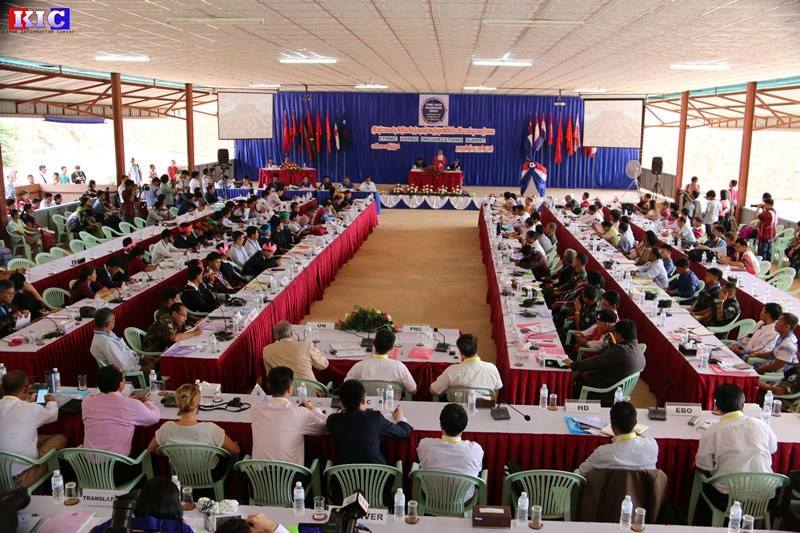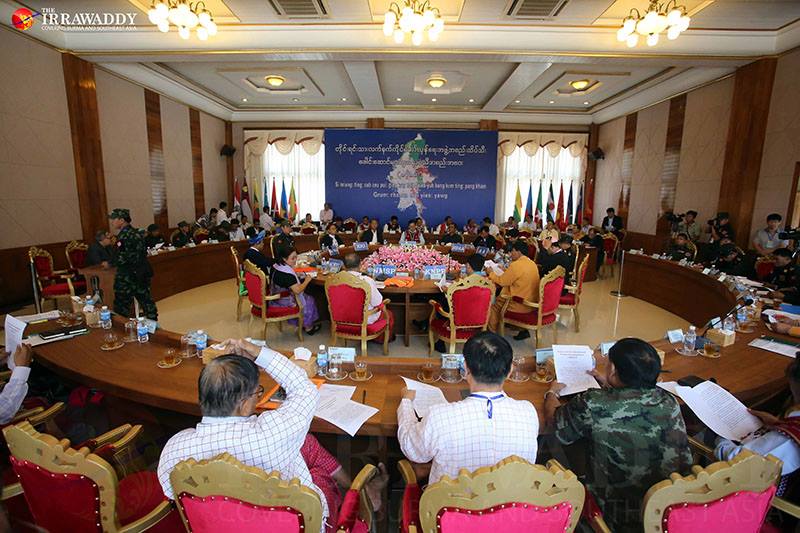Posts Tagged ‘Ethnic Armed Organisations’ (37 found)
Ethnic Leader Demands Prisoner Releases
 The chairman of the Pa-O National Liberation Organisation Khun Myint Tun said that the release of prisoners would be negotiated with the government before signing the nationwide ceasefire agreement […]
The chairman of the Pa-O National Liberation Organisation Khun Myint Tun said that the release of prisoners would be negotiated with the government before signing the nationwide ceasefire agreement […]
Ethnic Armed Organizations’ Summit Statement Law Khee Lar, Karen State, 2-9 June 2015
The Summit of the Ethnic Armed Organizations’ top leaders was held successfully at the KNU Headquarters’ Law Khee Lar Camp in Pa-an District, Karen State, for eight days, from June 2 to 9, 2015. The summit was attended by 108 representatives and observers from 17 Ethnic Armed Organizations, 11 members of the Nationwide Ceasefire Coordination Team (NCCT), 5 members of the NCCT technical assistance team, and specially invited personages, a total of 190 persons including office staff members […]
• • •Familiar Blocks on the Road to Peace
 As the ethnic armed groups’ summit in Panghsang, Shan State concluded on 6 May 2015, familiar obstacles still loom large in the peace process. Namely, the 2008 Constitution, continued attacks and human rights violations committed by the Burma Army, and a lack of trust. Various commentators and organizations, including Burma Partnership, sounded words of caution after the over excitement caused by the agreement in principle of the draft nationwide ceasefire agreement (NCA), and those words of caution are salient today as peace remains out of sight.
As the ethnic armed groups’ summit in Panghsang, Shan State concluded on 6 May 2015, familiar obstacles still loom large in the peace process. Namely, the 2008 Constitution, continued attacks and human rights violations committed by the Burma Army, and a lack of trust. Various commentators and organizations, including Burma Partnership, sounded words of caution after the over excitement caused by the agreement in principle of the draft nationwide ceasefire agreement (NCA), and those words of caution are salient today as peace remains out of sight.
The summit in Panghsang, territory controlled by the United Wa State Army (UWSA), brought together 12 major ethnic armed groups for talks that lasted six days. Groups that were present included those bearing the brunt of Burma Army offensives the past few weeks, the Kachin Independence Organization (KIO), the Ta’ang National Liberation Army (TNLA), the Arakan Army (AA), and the Myanmar National Democratic Alliance Army (MNDAA). In fact, as talks were being held, the Burma Army attacked Kachin Independence Army (KIA) positions with airstrikes. It is not just the armed groups themselves who are bearing the brunt of attacks, but horrific human rights violations committed by the Burma Army on fleeing ethnic Kokang villagers, such as extrajudicial killings, including beheadings, are creating deep-seated fear among those who have been displaced by the conflict, but who are being pressured to return by Burma authorities […]
• • •The Ethnic Armed Organizations’ Summit In Panghsang Addressed Key Issues In The Nationwide Ceasefire Agreement Draft
The Ethnic Armed Organizations Leaders Summit attended by a total of 65 leaders and observers from 12 Ethnic Armed Organizations (EAOs) was successfully held in Panghsang, the capital of the Wa special region of Northern Shan State on 1-6 May 2015 […]
• • •Nationwide Ceasefire Agreement Unlikely in April
On 31 March, the Nationwide Ceasefire Coordination Team (NCCT) and the Union Peacemaking Work Committee (UPWC) finalized the draft of the Nationwide Ceasefire Agreement (NCA), which comprises seven chapters and thirty-three sections. China, the UN, and other armed resistance organizations such as the Restoration Council of Shan State, All Burma Students Democratic Front, and Nationalist Socialist Council of Nagaland-Khaplang observed the latest round of the talks in Rangoon.
• • •ခ်င္းအမ်ိဳးသားညီလာခံ ဘံုသေဘာတူညီခ်က္မ်ား အေကာင္အထည္ေဖၚေရး ေပါင္းစပ္ညွိႏိႈင္းမႈေကာ္မတီ ထုတ္ျပန္ခ်က္
၁။ ၂၀၁၄ ခုႏွစ္ ႏို၀င္ဘာလ ၁၉ ရက္ေန႔တြင္ ေျမာက္ပိုင္းတိုင္းစစ္ဌာနခ်ဳပ္ ကြပ္ကဲမႈေအာက္ရွိ၊ ခမရ ၃၈၉ လက္ေအာက္ခံ တပ္ဖြဲ႔မ်ားက ကခ်င္လြတ္လပ္ေရးအဖြဲ႔၊ ဗိုလ္ေလာင္း သင္တန္းေက်ာင္းအား အေျမာက္ျဖင့္ ပစ္ခတ္တိုက္ခိုက္မႈေၾကာင့္ ခ်င္း အမ်ိဳးသားတပ္ဦးမွ အရာရွိေလာင္းႏွစ္ဦးအပါအ၀င္ အဖြဲ႕အစည္းအသီးသီးမွ အရာရွိေလာင္း ၂၃ ဦးက်ဆံုးခဲ့ၿပီး၊ ၂၀ ဦး ထိခိုက္ ဒါဏ္ရာ ရရွိခဲ့ေၾကာင္း သိရွိရသျဖင့္ မိမိတို႔အေနျဖင့္ အထူးတုန္လႈပ္ေျခာက္ျခားကာ ၀မ္းနည္းေၾကကြဲမိပါသည္။ […]
• • •‘If they had hope, they would speak’: The Ongoing Use of State-Sponsored Sexual Violence in Burma’s Ethnic Communities
In January 2014, the Women’s League of Burma (WLB) published a report which demonstrated the systematic use of rape by the Burma Army as a strategy to subjugate communities across the country. We documented over a hundred cases of sexual violence in the years since President Thein Sein took office – a number which we believe grossly underestimates the true scale of the problem. Drawing on evidence gathered by our member organisations across Burma, we argued that there are clear links between militarisation, investment and human rights abuses. We also proposed a number of steps to uproot the culture of impunity which surrounds sexual violence, and prevents survivors from obtaining justice. Whilst recent months have seen positive action taken in several areas, the pillars which provide impunity for perpetrators of human rights abuses remain in place. In January, we called for constitutional reform to place the military under civilian control; the establishment of effective judicial and non-judicial mechanisms to investigate human rights abuses, particularly those relating to sexual violence, and; greater participation of women in the peace process dialogue. […]
• • •









 All posts
All posts